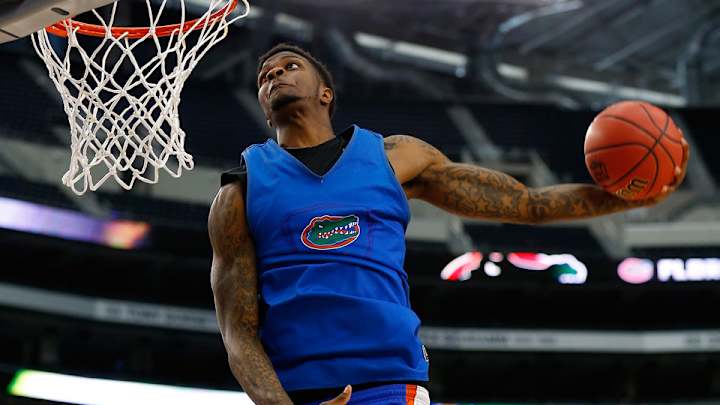Gator Bait: Florida's Chris Walker has all the tools -- but questions, too

This article appears in the Jan. 12 edition of SI. To subscribe, click here.
The first thing you notice about Florida’s Chris Walker is the body, a chiseled, 6' 10", 220-pound frame that NBA executives drool over. A year in the Gators’ weight room packed 17½ pounds of muscle on the sophomore forward and cut his body fat by 2.2%. “If teams drafted on body types,” says ESPN draft analyst Fran Fraschilla, “Chris Walker would be a high lottery pick.”
The next thing you notice is the athleticism. Walker has the strength to defend centers, the length (7' 3" wingspan) to cover forwards and the lateral quickness to stay in front of many guards. “He can run, jump, he has fast-twitch reactions,” says a Western Conference GM. “He can defend 1–5. He’s an NBA athlete.”
The last thing you notice is the skill set. Walker, 20, is a weapon in transition, but his range doesn’t extend outside the paint, and he’s little more than a screener and rim-runner in the half-court. “His offensive skill level is really low,” says Fraschilla. “He’s a major project.”
Walker understands the criticism, but he knows he’s overcome worse. Raised in Bonifay, a small town (pop. 2,793) in the Florida Panhandle, Walker was abandoned by his parents as an infant to be raised by his grandmother. She died when he was 12, and a family friend, Jeneen Campbell, became his guardian. He declined opportunities to go to powerhouse prep schools in order to stay close to home and attend Holmes County High, where he developed into a McDonald’s All-American and a top 15 recruit in the class of 2013.
NBA Big Board 2.0: Jahlil Okafor tops latest rankings; Cauley-Stein climbs
Walker committed to Florida, but his inability to qualify academically prevented him from enrolling until December 2013. Outside a structured system, Walker struggled to stay in shape; he played pickup games and lifted weights at a local high school. “That set me back,” he says. “I couldn’t work out with my teammates, couldn’t develop chemistry.” When he finally joined the Gators, he missed 10 more games while the NCAA investigated allegations that he had received improper benefits in high school, and an additional two when it was determined he had. By the time he took the court on Feb. 4, Florida was in the midst of a 30-game winning streak, and Walker played just 4.8 minutes, scoring 1.9 points, in 18 games.
Still, Walker considered going pro after the season. He Googled Chris Walker and 2014 draft. “Didn’t like what it said,” he says with a laugh. Ultimately, Walker decided to return. “I needed to get stronger, and I needed to learn the game,” he says. “When I go to the NBA, I want to go and actually play. I don’t want to sit or play in the D-League.”
For Walker, this season isn’t about numbers (he’s averaging 6.4 points and 4.1 rebounds in 16.0 minutes a game) or perfecting a certain move. It’s about getting comfortable in a faster, more physical game. “I’m focusing on knowing when to pass, when to make a quick move,” he says. “It’s a process.” Walker envisions himself having a polished face-up game highlighted by a reliable midrange jumper. “Nothing crazy like Dirk Nowitzki,” he says. “Just be able to be a threat from that spot.”
NBA executives say Walker made the right decision in returning to Florida this season—and that he should think about staying even longer. They cite Gators head coach Billy Donovan’s track record of developing big men, specifically Al Horford and Joakim Noah: Both were fringe NBA prospects when they arrived in Gainesville but were lottery picks when they left after three seasons. “If he comes out now, someone will take him in the first round,” says an Eastern Conference executive. “But he’s years from being ready.”
“There are signs the basketball IQ is there,” says Fraschilla. “He just has to work on developing some offensive skills.”
Walker is the type of prospect who both tantalizes and terrifies NBA execs, a physical specimen almost impossible to project. For Walker, though, the NBA is a decision that can wait. “I’m so much more relaxed,” he says. “I don’t care what people say. I’m just having fun.”
